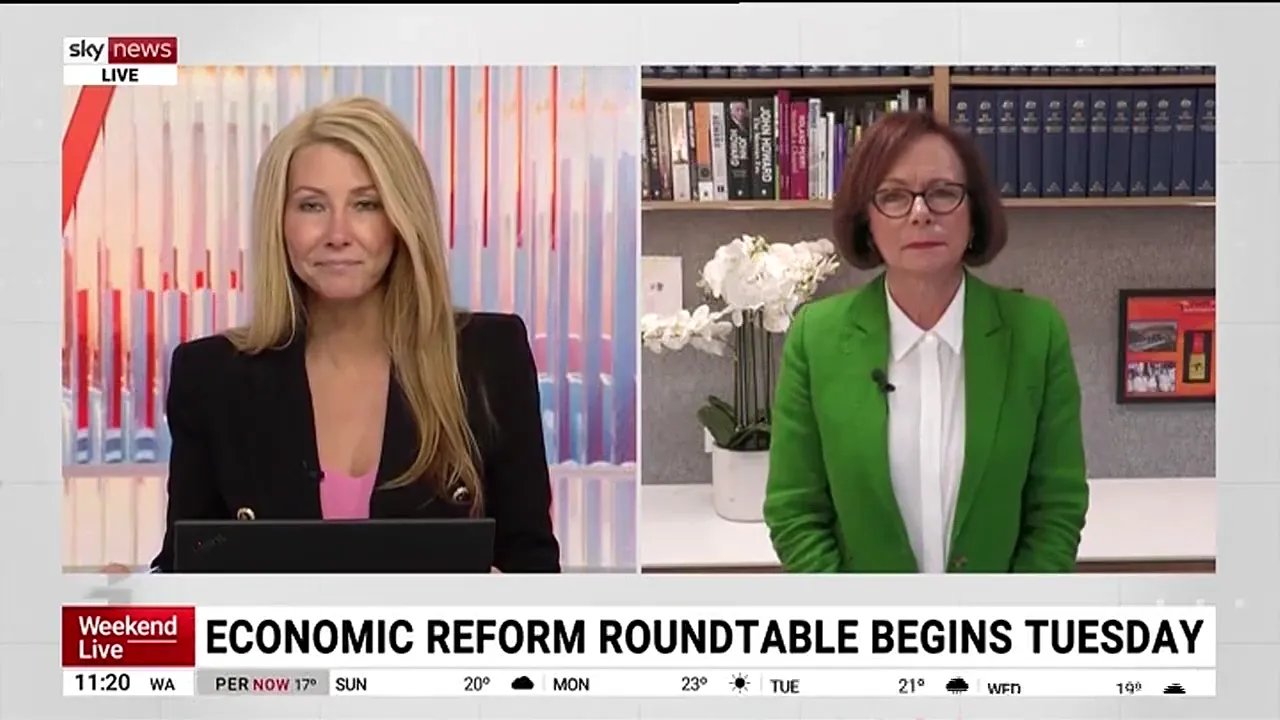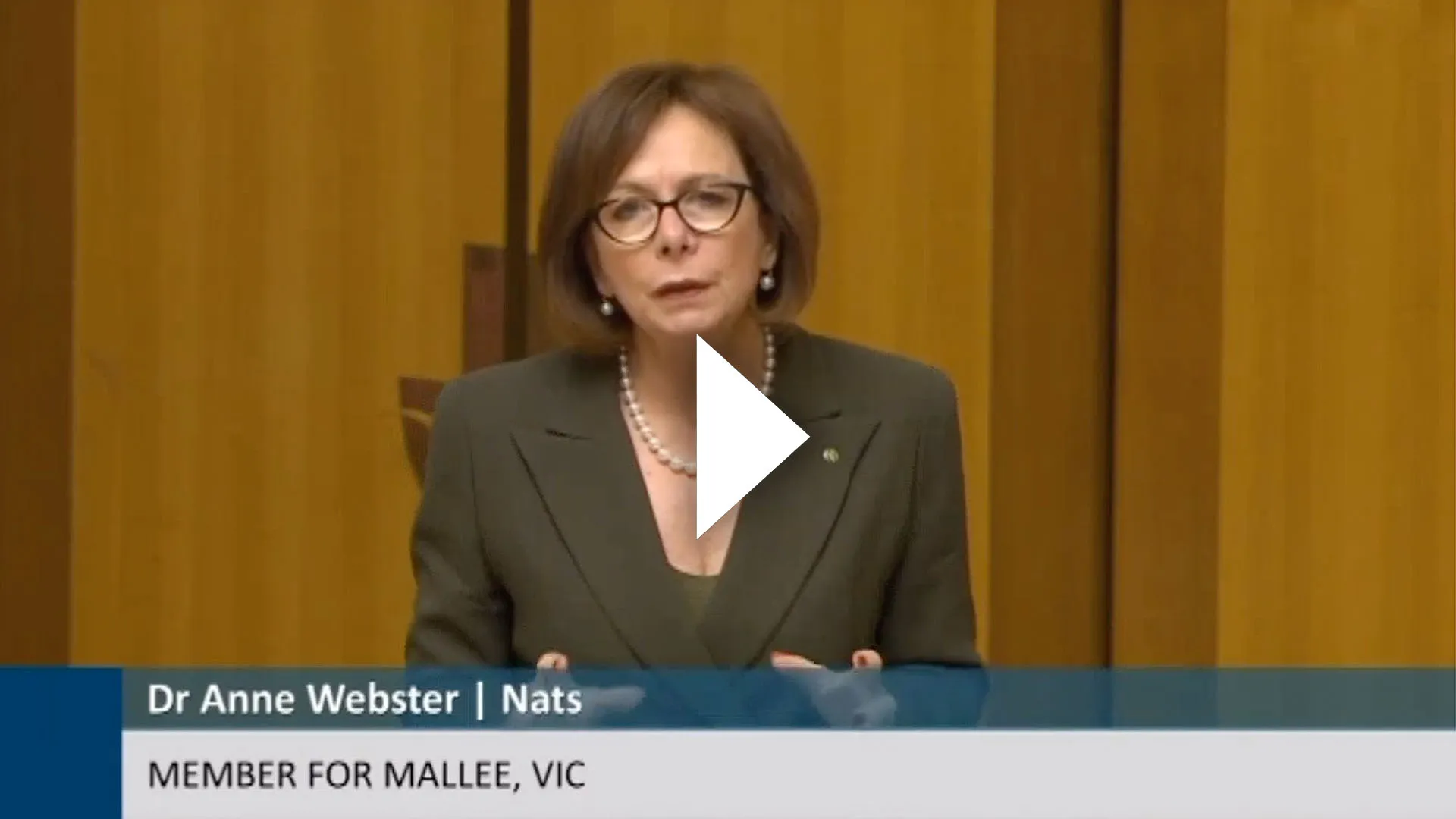Interview with Jaynie Seal, Sky News 'On the Hour' - Transcript - Sunday 17 August 2025

DR ANNE WEBSTER MP
SHADOW MINISTER FOR REGIONAL DEVELOPMENT, LOCAL GOVERNMENT AND TERRITORIES
SHADOW MINISTER FOR REGIONAL COMMUNICATIONS
FEDERAL MEMBER FOR MALLEE
TOPICS:
Net Zero targets, energy policy, renewable energy rollout, productivity, community engagement, non-disclosure agreements, fines for farmers, energy from waste, data centres.
SEAL
Liberal MPs have been sent a barrage of emails over the party's stance on net zero by lobby group Advance. According to The Guardian, some recipients have been sent more than 100 emails within 48 hours from the same email address criticising the party's energy policy. The group is demanding they drop Net Zero targets or risk losing support. Opposition Leader Sussan Ley has rejected accusations she is dodging a Net Zero policy decision, and the economic reform roundtable is on next week with a focus on productivity, economic resilience and budget sustainability. For more, we're joined by Shadow Minister for Regional Development, Anne Webster, great to see you as always Anne - so yes, as we've just heard, David Littleproud is saying that it's a talk fest. Many others are as well, but a lot of people are also hopeful. What do you think?
WEBSTER
Look, I think that first of all, you need to have the right people around the table. Has Labor done that? My understanding is that, as David has already indicated, the unions have got, you know, first priority place around that table, and that's concerning in itself. I think that one of the key issues is energy. And it seems to me, given the government's direction to the Productivity Commission, that it needs to find greater ways to improve the rollout of renewable energy and Net Zero, transitioning to net zero, that is the elephant in the room, because energy is our economy. If we want to improve productivity, then we need reliable and affordable energy, and that is not what this government is focused on. You know, I noted your comments just earlier regarding the Liberal Party. Well, the National Party is doing our review on Net Zero currently as well, and that needs to take into account the economic outcome of continuing to push towards Net Zero, because it will have an enormous impact. As it is already, people are feeling it every month on their power bills. It's not going to get better anytime soon.
SEAL
They're also feeling it in the community, aren't they, with the rollout. It's dividing people. People are happy, people are not, and people are also really disappointed in some areas about the poor community engagement from proponents and also government.
WEBSTER
Absolutely. Tomorrow morning, Senator. Bridget McKenzie and I will be down at Marnoo, little teeny weeny place down in the south of my electorate. We'll be meeting with, I suspect, a lot of farmers and people in the community who are deeply concerned not just about the division, but the way that the Victorian and the federal government have been managing this roll out of renewables, the cowboys have come in. They've had farmers signing non disclosure agreements - neighbours find out later. They're deeply distressed because easements between those turbines - which are massive, almost the height of the Eureka tower in Melbourne - they will be near their properties, but they haven't been incorporated in any of those discussions. The ill-will and the sense of, I think, despair and despondency that the government is driving this agenda home is being deeply felt, and the VNI West, of course, the Victorian Government has, as we know now, stated that farmers will be fined $12,000 if they don't open the gates, if they object, and if they're a company and they don't open the gates for VNI West engineers to come in and do their thing, then it could be up to $48,000 fines. These are really serious, and it is just simply put, more ill-will in the communities, people feel like their arms are up their back and they have no choice. This is not government, this is socialism.
SEAL
There's also other projects which are probably not getting the media attention they perhaps deserve. In New South Wales, the incinerators, the energy from waste facilities which transfer rubbish from cities to regional areas, a $1.5 billion project in Parkes. We're just looking at Lara in Victoria, where you are, of course, they've got meetings ahead, and they are standing up against the waste incinerator. It's in, I believe, Richard Marles’ seat, the Deputy Prime Minister. So, a lot of these big projects, yet again, being built across the regions. And then if we look at what else is going to be discussed in the roundtables next week, is productivity in AI, but we need data centres as well, which are being built in the city but also in regional areas. What can you tell us about these projects?
WEBSTER
Well, starting with the data centres, fantastic. It is the way of the future. We just need to constantly adjust and evolve, and you need a lot of power. That's why, in America, they are building AI data centres next to nuclear power plants. There's a reason for that, because they chew up immense amounts of power, so you're not going to get that from turbines and solar panels, just saying. And we need to be very serious about these projects and which ones are going to enhance the life of those who live in those regions, but also take account of doing things better in the future. I think, you know, I noted Bernard Salt wrote an article in the Australian today, which I read with interest. The continuing divide between the bush and the city and energy is just one of those subjects and realities that absolutely divides us, because it's out in the regions that we wear the brunt of all of these great ideas and the cities benefit by it. There's no problem with that, but there needs to be an understanding that regions deserve better, yet 90 per cent of Australia's food comes from regional and rural Australia.
SEAL
We've got to wrap it up. But Anne Webster, always great to see you.
WEBSTER
Thank you. Thanks Jaynie.



